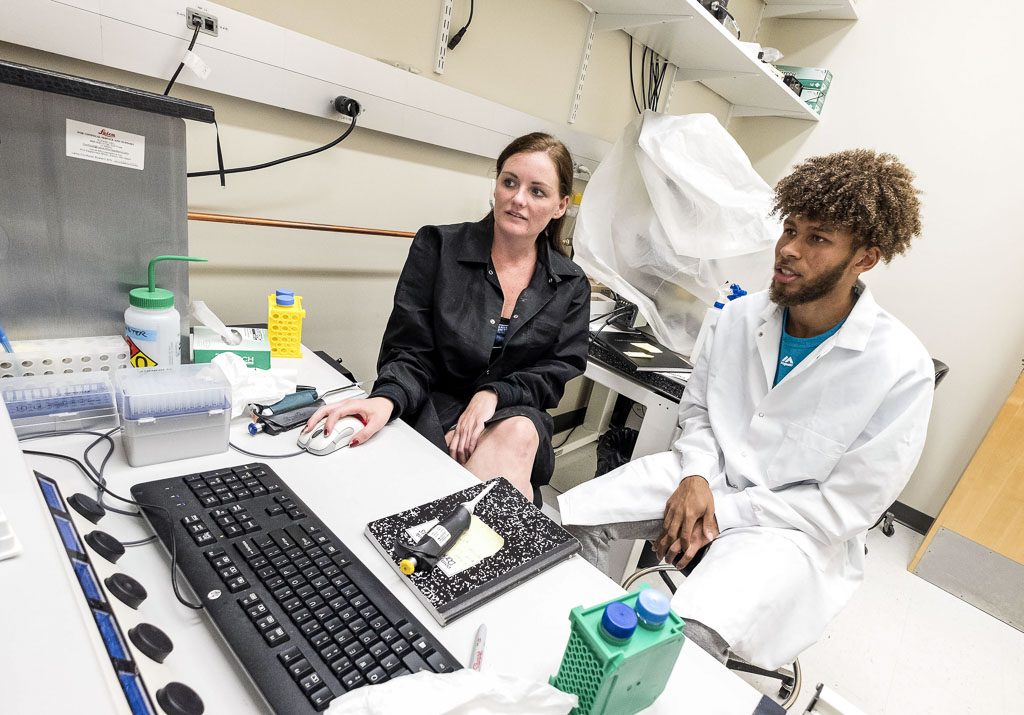Keith Rogers didn’t know he wanted to be a researcher. Then he came to Carolina.

When he entered his first year at Oakwood University, Keith Rogers thought he wanted to be a physician.
But two years later, Rogers came to the University of North Carolina at Chapel Hill and his plans changed. He participated in the Summer of Learning and Research (SOLAR) program, which is one of more than a dozen summer research programs at Carolina that seek to interest diverse undergraduates in graduate research and careers in science.
“After I went to UNC, I realized research was exactly what I was looking for,” he said.
So Rogers came back the next summer, to continue his research into lung health. Again he spent his summer surrounded by experts in many different labs on campus and experiencing the collaborative environment. Rogers knew he wanted to come back again – this time, for graduate school.
In August, Rogers begins his doctoral studies in the Biological and Biomedical Sciences Program, where he wants to continue to study lung health.
“It was coming to UNC that cultivated the love for this research,” he said. “The methods that the lab used were very interesting to me and I want to keep doing things like that.”
The first person Rogers met on campus was Jessica Harrell, director of the SOLAR program. Harrell shared some important advice with Rogers: Sometimes science isn’t going to go the way you want. Part of being a scientist is understanding that things will go wrong.
Harrell said that students are used to thinking that if they are productive, they will be successful, so setbacks feel uncomfortable.
“Failed experiments and unexpected results are a natural part of doing research, though. This is why students have to be resilient and be self-motivated to continue to do experiments and keep digging for answers, even when they have setbacks,” she said.
As part of The Graduate School’s Diversity and Student Success program, the Summer Undergraduate Pipeline (SUP) brings together summer undergraduate research programs and holds an annual research symposium in which student researchers share their discoveries.
SUP complements the efforts of these programs by helping diverse undergraduate students train and transition to graduate school, said Kathy Wood, co-director of Diversity and Student Success.
“Since the Summer Undergraduate Pipeline was established four years ago, participation has increased significantly,” Wood said. “This means we are reaching more students who may not have access to these types of resources at their undergraduate university. Our goal is to show students that graduate school is within their reach.”
Harrell said there is a need to increase diversity in scientific leadership across the spectrum of science careers.
“We are working to spark undergraduate students’ interest in pursuing research careers so that they can build their skills and their confidence to be competitive applicants to graduate school,” Harrell said.
During the program, Rogers studied how e-cigarette cells affected lung epithelial cells. When epithelial cells get damaged, you are more susceptible to lung disease or cancer, COPD, asthma and other problems. He worked with and was mentored by Robert Tarran, an associate professor in the cell biology and physiology department, and postdoctoral fellow Megan Webster. Rogers’s poster presentation won first place in the Summer Undergraduate Pipeline Research Symposium in 2016.
Now, Rogers is considering a career as a researcher in government and industry. “I’m excited to start my next phase into this journey into the sciences.”
He said he’s really thankful for the opportunity to come to UNC, conduct research and realize his love for research.
“The internships that I had were valuable in shaping me as a scientist and will continue to be as I earn my Ph.D. here.”
